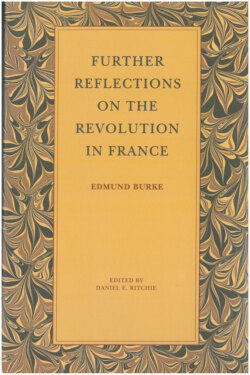Читать книгу Further Reflections on the Revolution in France - Edmund Burke - Страница 7
На сайте Литреса книга снята с продажи.
ОглавлениеEDITOR’S NOTE
Regarding the texts used for this edition, the letters to Charles-Jean-François Depont and Philip Francis come from Correspondence of the Right Honourable Edmund Burke between the Year 1744, and the Period of his Decease, in 1797, eds. Charles William Wentworth-Fitzwilliam, 5th Earl Fitzwilliam, and Sir Richard Bourke, 4 vols. London: Francis and John Rivington, 1844. They have been compared with the Copeland edition of Burke’s Correspondence. The other texts have been chosen in accordance with William B. Todd’s Bibliography of Edmund Burke (London: Rupert Hart-Davis, 1964) to represent the most authoritative version of each work.
The text of A Letter to a Member of the National Assembly is that of the first impression of the first English edition on 21 May 1791.
The text of An Appeal from the New to the Old Whigs, first published on 3 August 1791, comes from the fourth impression of the first edition.
Thoughts on French Affairs, written in December 1791, comes from the first impression of the first edition, published on 7 September 1797, in Three Memorials on French Affairs.
Letter to William Elliot, dated 26 May 1795, comes from the first impression of the first edition of Two Letters on the Conduct of Our Domestick Parties, With Regard to French Politicks, published on 31 October 1797.
The text of A Letter to a Noble Lord, first published on 24 February 1796, comes from the thirteenth impression.
Minor errors of spelling have been silently corrected, although the eighteenth-century orthography of the texts has been preserved. One or two minor doubtful readings have been revised for greater clarity, in accordance with the Bohn and Oxford editions, and other variants have been compared. Burke’s eighteenth-century Greek has been modernized. Quotation marks surround translations from Latin if the quote is direct or fairly direct; quotation marks do not surround translations of proverbial Latin sayings and very indirect (or untraceable) Latin quotations. The editor’s footnotes are bracketed to distinguish them from Burke’s, which have all been retained.
I wish to express appreciation to the staffs of the Beinecke Rare Book Room at the Yale University Library and of the Boston Athenaeum for providing the needed texts. Professor Jeremiah Reedy of Macalester College provided the long translation from Walsingham in An Appeal from the New to the Old Whigs and gave useful advice on many of the Latin translations.
Burke scholars will recognize the influence of Francis Canavan and Peter Stanlis in my Foreword, and to them I express gratitude.
This book is dedicated to my wife, Judith C. Ritchie:
Esse sacerdotes delubraque vestra tueri
Poscimus; et quoniam concordes egimus annos,
Auferat hora duos eadem, nec conjugis unquam
Busta meae videam, neu sim tumulandus ab illa.
